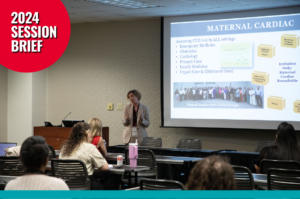 By Sydney Barrilleaux
By Sydney Barrilleaux
Cooperation and innovation are the cornerstones of a new effort to counter maternal mortality in Georgia. HOPE (Healthy Outcomes and Positive Experiences) for Georgia Moms is a program focused on reducing maternal mortality and disparities in healthcare. As the name suggests, the goal is to ensure mothers are receiving the quality, respectful care they need to thrive.
The project was described at a breakout session focused on maternal health during the 13th Annual State of the Public’s Health Conference held at the University of Georgia on Oct. 24. The session detailed not only the current maternal health crisis in Georgia, but the steps taken to address it.
Georgia’s maternal mortality rate is among the worst in the nation, with 33.9 deaths per 100,000 births. There are also major racial disparities, with Black women over twice as likely to die from complications related to pregnancy.
Maribel Luviano, project coordinator for HOPE for Georgia Moms, said that various perspectives are needed when confronting this issue.
“As a program, HOPE for Georgia Moms aims to be that collaborative environment that enables the partnerships to drive progress toward zero preventable deaths,” said Luviano.
Members of HOPE for Georgia Moms formed a task force with a diverse group of organizations, clinicians and those with personal experience related to maternal health. These “persons with lived experience” were essential in bringing unique perspectives and making sure the voices of marginalized groups were heard.
“I remember having a task force member come to me after a meeting and just saying that oftentimes she felt that she was invited to tables just to check off a box for someone and that, with us, it felt that we genuinely cared about her input,” said Luviano.
The task force serves as an advisory council for developing solutions to improve the well-being of mothers.
Heidi Ehrenreich, project director for HOPE for Georgia Moms, described partnerships involving Irth, an app that lets people of color rate how respectfully their healthcare providers treated them. Other initiatives include a roundtable discussing cardiovascular disease risk and a program providing peer mental health, particularly for substance use disorder.
Though the dominant narrative focuses on Georgia’s high maternal mortality rate, Ehrenreich is impressed with what’s already being done. She is hoping that HOPE for Georgia Moms will be able to make current efforts “new and more impactful.”
“Now is a really great time for maternal health,” said Ehrenreich. “There’s a lot of momentum and there’s a lot we can do with that momentum working together.”
